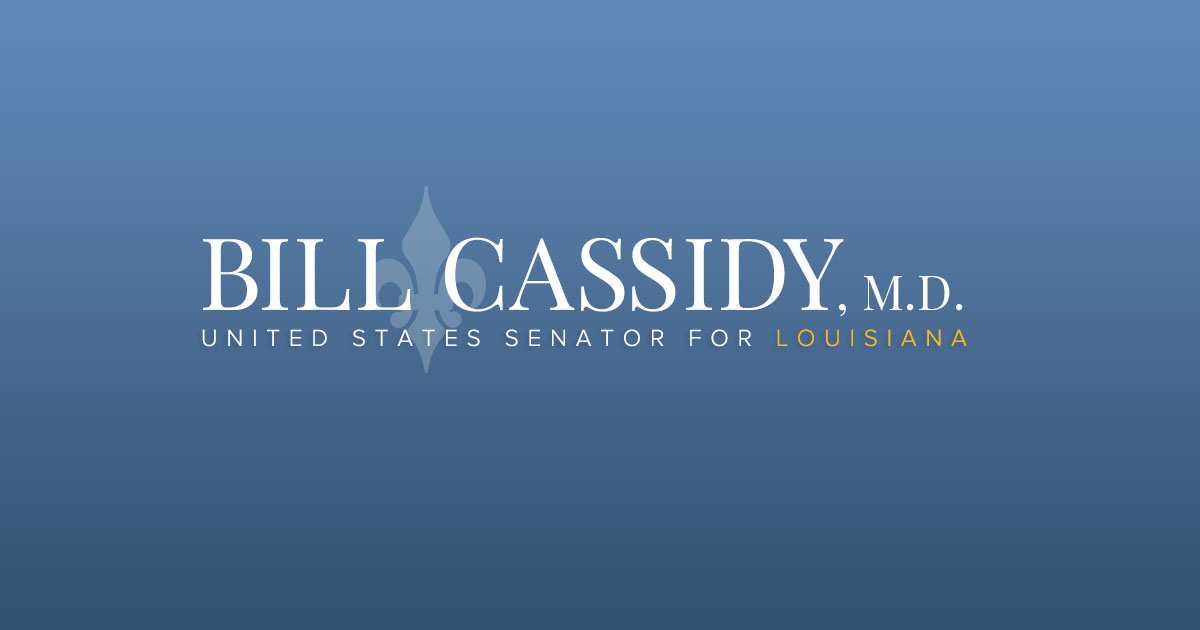Source: United States Senator for Louisiana Bill Cassidy
06.11.21
WASHINGTON – Today, U.S. Senators Bill Cassidy, M.D. (R-LA), Joe Manchin (D-WV), Jerry Moran (R-KS), Susan Collins (R-ME), and John Boozman (R-AR) introduced the bipartisan VA Provider Accountability Act to address the 2019 GAO Report that found the VA must take action to ensure its health care providers have the appropriate qualifications and clinical abilities to deliver safe, high quality care to Veterans.
“Veterans who went to war for our freedom deserve quality care,” said Dr. Cassidy. “Increasing accountability for veteran health care providers ensures Louisiana veterans are safe and cared for.”
“West Virginia Veterans have experienced firsthand the impacts of the VA not properly vetting healthcare providers, which resulted in the death of seven Veterans at the Clarksburg VA Medical Center,” said Senator Manchin. “It is our responsibility to ensure our brave Veterans who sacrificed for our nation receive the highest quality care when they return home. Our bipartisan bill will address these prevalent issues in the VA healthcare system by instituting requirements to keep the VA, and their healthcare providers accountable and our Veterans safe and cared for.”
“Kansas veterans have suffered the consequences of VA turning a blind eye to concerns about the competency of medical providers and ignoring serious medical errors,” said Senator Moran. “Over three years have passed since the conviction of a former Leavenworth VAMC physician assistant, who committed horrendous crimes against veteran patients, and I’m not satisfied that everything that can be done legislatively or administratively has been, or is being done, to ensure veterans are only receiving the highest quality care possible.”
“Our nation’s veterans deserve access to the high-quality health care that they have earned through their service to our country. As the daughter of a World War II veteran, I was shocked and outraged by investigations that found far too many instances of patients’ care being mismanaged by medical providers,” said Senator Collins. “By requiring the VA to report these issues in a timely manner and prohibiting the concealment of serious medical errors in settlements with fired VA employees, this legislation would help restore accountability, protect veterans, and enhance the care that they receive at the VA.”
“When VA doctors fail to live up to the mission of providing veterans the quality care they earned for their service, they must be held accountable. Our legislation promotes transparency so we can prevent providers who have a track record of mistakes or misconduct from endangering patients. Tragically, that occurred at the Fayetteville VA where a lack of oversight and accountability resulted in inexcusable outcomes, including faulty diagnoses and deaths. This will help ensure veterans get the high quality and safe care they deserve,” said Senator Boozman.
The VA Provider Accountability Act would require the VA to:
- Compile, verify and continuously monitor the professional licensures, certifications and registrations with the Drug Enforcement Administration (DEA), National Practitioner Data Bank (NPDB) and the applicable state licensing boards for certain VA health care professionals.
- Require certain VA health care professionals hold an active DEA registration.
- Conduct ongoing, retrospective, and comprehensive monitoring of the performance and quality of the health care delivered by each health care professional to include concerns of competency or quality of care delivered by a health care professional are reported, as appropriate, to the state licensing, registration, or certification body of the health care professional.
- Provide biannual training on these licensure, employment and reporting requirements to employees performing these duties.
- The bill would also prohibit VA from entering into a settlement agreement regarding a claim by a VA employee under which it would be required to conceal a serious medical error or lapse in clinical practice that constitutes a substantial failure.
###
